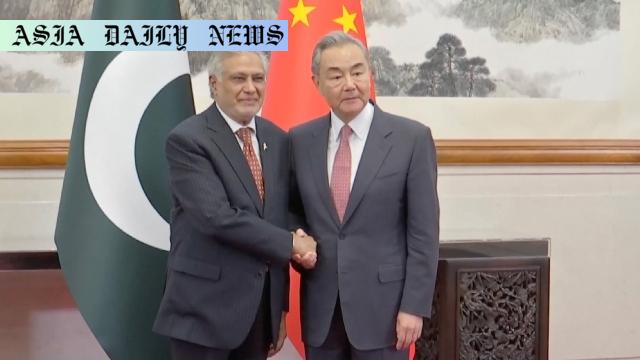Kashmir: Pakistan urges peaceful resolution as China backs its territorial integrity amidst ongoing regional disputes.
China backed Pakistan in its disputes with India over Kashmir.
Peaceful resolution is sought in line with UN Security Council resolutions.
Both nations will deepen cooperation under the Belt and Road Initiative.

China’s Support for Pakistan in the Kashmir Conflict
Amid escalating tensions between India and Pakistan over the disputed Kashmir region, China has reiterated its unwavering support for Pakistan’s territorial integrity. In a high-stakes meeting in Beijing, Pakistan’s Foreign Minister Ishaq Dar emphasized the urgent need for a peaceful resolution to the Kashmir issue, citing United Nations Security Council resolutions as the framework for achieving lasting peace in the region.
The meeting, which included China’s Foreign Minister Wang Yi, underscored Beijing’s strong ties with Pakistan. China emphasized its continued backing of Pakistan’s sovereignty, particularly at a time when tensions with India remain heightened. This support is further bolstered by the two nations’ agreement to enhance industrial and agricultural cooperation under the ambitious Belt and Road Initiative (BRI), of which Pakistan is a key partner.
Background on Kashmir’s Disputed Status
The origin of the current tensions can be traced back to a devastating terror attack last month in Indian-administered Kashmir, which claimed the lives of 26 individuals. The event triggered a series of retaliatory missile and drone attacks between Pakistan and India, plunging the region into chaos. Although a ceasefire agreement was brokered earlier this month by the United States, the situation remains fragile, with both sides accusing each other of violating the truce.
Pakistan has consistently maintained that the Kashmir dispute requires international attention and resolution through diplomatic channels. Referring to the United Nations Security Council resolutions on Kashmir, Pakistan’s leader stated that the issue must be resolved to ensure lasting stability and prevent further hostilities in South Asia.
China’s Call for Dialogue
During their discussions, Wang Yi reaffirmed China’s belief in dialogue as the path forward. He highlighted Beijing’s willingness to assist in mediating a sustainable ceasefire between India and Pakistan. Wang Yi’s statement reflects China’s vested interest in the stability of the South Asian region, which is crucial for the success of its flagship infrastructure project, the Belt and Road Initiative.
Collaborative economic efforts between the two countries have already shown promise. The expansion of industrial and agricultural projects aligned with the BRI framework showcases the growing interdependence between China and Pakistan, underscoring China’s long-term strategic priorities in South Asia.
Broader Implications for Regional Peace
The ongoing Kashmir dispute remains a sensitive issue with potential implications for global peace and security. With two nuclear-armed neighbors at odds, the region has long been a flashpoint of military conflict. Recent exchanges of fire along the Line of Control (LoC) further highlight the urgent need for an enduring solution.
China’s move to stand by Pakistan on matters of sovereignty intensifies its strategic rivalry with India while reinforcing its influence in South Asia. This development requires careful analysis as the geopolitical dynamics involving China, Pakistan, and India continue to evolve. The emphasis on dialogue and adherence to diplomatic frameworks should be at the forefront of regional and international efforts to de-escalate tensions.
Conclusion
As the Kashmir issue continues to dominate the discourse in South Asia, the involvement of global powers like China highlights the complexity of the conflict. Pakistan’s calls for diplomatic resolutions find resonance in China’s assertions for peace and dialogue. Meanwhile, tensions with India underline the broader geopolitical implications of the region’s unresolved disputes. Moving forward, sustained efforts toward cooperation and peaceful dialogue will be essential to ensure a stable and secure future for South Asia.
Commentary
The Importance of China’s Role in South Asia
China’s active participation in addressing the Kashmir conflict reflects its growing influence as a major player in South Asia. Beijing’s vocal support for Pakistan highlights its commitment to strengthening bilateral ties and maintaining a strategic foothold in the region. However, this also adds another layer of complexity to the India-Pakistan dynamic, potentially tilting the regional power balance further. By aligning itself with Pakistan, China underscores its opposition to unilateral actions, especially those it views as destabilizing or contrary to its geopolitical interests.
A Need for Peaceful Diplomacy
The Kashmir dispute remains one of the most contentious issues in international politics. It not only affects the lives of millions in the region but also serves as a constant source of tension between two nuclear powers. As such, China’s emphasis on dialogue and adherence to diplomatic principles is a welcome development. Achieving long-term peace requires robust international cooperation and comprehensive dialogue involving all stakeholders.
Looking Ahead
Ultimately, solving the Kashmir issue offers an opportunity for South Asia to unlock greater potential for economic growth and regional stability. However, this requires a concerted effort to prioritize reconciliation over retaliation. China’s support for Pakistan could serve as a catalyst for constructive discussions if balanced with appropriate measures to engage India. Moving beyond the status quo is imperative to achieving a sustainable and peaceful resolution to the longstanding conflict.


